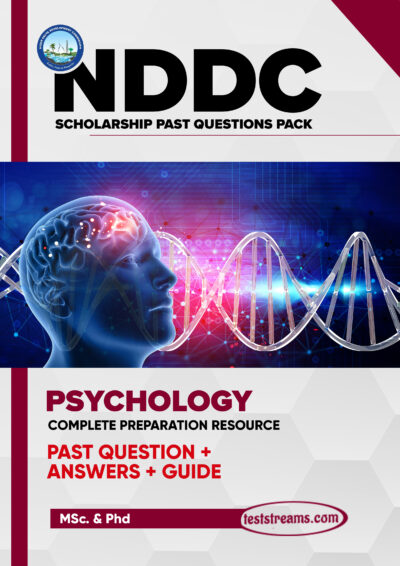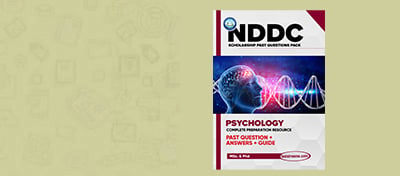NDDC Scholarship Psychology Past Questions And Answers [Free – Download]
Are you passionate about understanding the human mind and behavior? Seize the golden opportunity to pursue your dreams with the prestigious NDDC Scholarship in Psychology! We are thrilled to present the ultimate study companion to help you excel in the upcoming exam!
Introducing our exclusive NDDC Scholarship Psychology Past Questions and Answers guide – a comprehensive resource meticulously crafted by experts to elevate your preparation to new heights. With a wealth of past exam questions at your disposal, you’ll gain the confidence and knowledge needed to outperform your peers!
What Makes Our NDDC Scholarship Past Questions Stand Out?
- Comprehensive Coverage: Our collection spans multiple years, ensuring that you’re well-prepared for any surprises the exam might throw your way.
- Detailed Answers: Each question is accompanied by a comprehensive answer guide, allowing you to learn from your mistakes and reinforce your knowledge.
- Exam-Relevant Content: Our team of experts has painstakingly compiled the most relevant topics and questions that align with the NDDC Scholarship exam syllabus.
About NDDC Scholarship Test Style and Format (Updated)
NDDC overseas scholarship test was conducted by Cinfores-Ltd, between 2010 and 2015. Since 2016, the tests are now conducted by MEIL (MARG Educational International Limited).
The test usually comprises of 2 sections –
1. General questions which everyone will have to sit, and
2. Discipline-based questions.
For example, candidates in Engineering and Science related disciplines could take a mix of science-based questions like maths, English, physics, and chemistry for part 1, then discipline-specific questions for part 2.
2016 and 2017 tests contained more discipline-specific tests and English language tests as general papers. The test usually lasts between 30 to 60 minutes.
Sample Past Questions for NDDC Scholarship Aptitude Test – for PSYCHOLOGY candidates
1. Which of the following is NOT a branch of psychology?
A) Developmental psychology
B) Cognitive psychology
C) Organic psychology
D) Social psychology
Answer: C) Organic psychology
2. What is the difference between classical and operant conditioning?
A) Classical conditioning involves voluntary behaviors, while operant conditioning involves involuntary behaviors.
B) Classical conditioning involves pairing a neutral stimulus with an unconditioned stimulus, while operant conditioning involves reinforcing or punishing a behavior.
C) Classical conditioning is a form of observational learning, while operant conditioning is a form of associative learning.
D) Classical conditioning is a type of reinforcement, while operant conditioning is a type of punishment.
Answer: B) Classical conditioning involves pairing a neutral stimulus with an unconditioned stimulus, while operant conditioning involves reinforcing or punishing a behavior.
3. What is the concept of the unconscious mind?
A) The part of the mind that is aware of all our thoughts and actions
B) The part of the mind that stores all our long-term memories
C) The part of the mind that is responsible for our dreams
D) The part of the mind that contains thoughts, feelings, and memories that are not easily accessible to our conscious awareness
Answer: D) The part of the mind that contains thoughts, feelings, and memories that are not easily accessible to our conscious awareness
4. Which of the following is NOT one of the Big Five personality traits?
A) Extraversion
B) Agreeableness
C) Conscientiousness
D) Empathy
Answer: D) Empathy
5. What is the difference between conformity and obedience?
A) Conformity involves changing one’s behavior to match the expectations of a group, while obedience involves following the orders of an authority figure.
B) Conformity involves following the orders of an authority figure, while obedience involves changing one’s behavior to match the expectations of a group.
C) Conformity and obedience are the same thing.
D) Conformity involves engaging in deviant behavior, while obedience involves following social norms.
Answer: A) Conformity involves changing one’s behavior to match the expectations of a group, while obedience involves following the orders of an authority figure.
6. What is the difference between sensation and perception?
A) Sensation involves the interpretation of sensory information, while perception involves the detection of sensory information.
B) Sensation and perception are the same thing.
C) Sensation involves the detection of sensory information, while perception involves the interpretation of sensory information.
D) Sensation involves the interpretation of sensory information, while perception involves the processing of motor information.
Answer: C) Sensation involves the detection of sensory information, while perception involves the interpretation of sensory information.
7. What is the bystander effect?
A) The tendency for people to conform to the behavior of others in order to be liked and accepted
B) The tendency for people to engage in risky behavior when they are in a group
C) The tendency for people to be less likely to help someone in distress when other people are present
D) The tendency for people to be more likely to help someone in distress when other people are present
Answer: C) The tendency for people to be less likely to help someone in distress when other people are present
8. Which of the following is NOT one of the three main components of attitude?
a. Affective
b. Cognitive
c. Behavioral
d. Sensory
Answer: d
9. Who is considered the founder of psychoanalysis?
a. B.F. Skinner
b. Ivan Pavlov
c. Carl Jung
d. Sigmund Freud
Answer: d
10. Which of the following is NOT a stage of Erikson’s psychosocial development theory?
a. Autonomy vs. Shame and Doubt
b. Industry vs. Inferiority
c. Trust vs. Mistrust
d. Obedience vs. Disobedience
Answer: d
11. Which of the following is NOT one of the Big Five personality traits?
a. Neuroticism
b. Extraversion
c. Agreeableness
d. Humility
Answer: d
12. Which of the following is NOT a type of memory?
a. Sensory memory
b. Short-term memory
c. Long-term memory
d. Immediate memory
Answer: d
13. Which of the following is NOT a type of learning?
a. Classical conditioning
b. Operant conditioning
c. Observational learning
d. Instinctive learning
Answer: d
14. Which of the following is NOT a type of intelligence in Gardner’s theory of multiple intelligences?
a. Linguistic
b. Mathematical
c. Naturalist
d. Rational
Answer: d
15. Which of the following is NOT a type of attachment style?
a. Secure
b. Anxious-ambivalent
c. Avoidant
d. Aggressive
Answer: d
16. Which of the following is NOT a type of motivation?
a. Intrinsic
b. Extrinsic
c. Biological
d. Transcendental
Answer: d
17. Which of the following is NOT a type of defense mechanism in Freud’s psychoanalytic theory?
a. Denial
b. Projection
c. Suppression
d. Conformity
Answer: d
18. Which of the following is NOT a type of psychological disorder?
a. Anxiety disorders
b. Mood disorders
c. Schizophrenia disorders
d. Cardiovascular disorders
Answer: d
19. Which of the following is NOT a type of therapy?
a. Cognitive-behavioral therapy
b. Psychoanalytic therapy
c. Humanistic therapy
d. Invasive therapy
Answer: d
20. Which of the following is NOT one of the major perspectives in psychology?
a) Biological
b) Cognitive
c) Psychoanalytic
d) Political
Answer: d) Political

Other Related Packs
PRODUCTION ENGINEERING.
PETROLEUM ENGINEERING
ELECTRICAL ENGINEERING
AGRICULTURAL ECONOMICS
CIVIL ENGINEERING
MECHANICAL ENGINEERING
ENVIRONMENTAL SCIENCE
MEDICAL SCIENCE
MANAGEMENT SCIENCE
EDUCATION AND HUMANITIES.
FISHERIES
GEOLOGY.
JOURNALISM
CHEMISTRY
CHEMICAL ENGINEERING.
BIOLOGY
COMPUTER ENGINEERING


![NDDC Scholarship Computer Science Past Questions And Answers [Free – Download] NDDC Scholarship Computer Science Past Questions And Answers [Free – Download]](https://teststreams.com/blog/wp-content/uploads/2023/07/NDDC-COMPUTER-SCIENCE.jpg)
![NDDC Scholarship Agric Economics Past Questions And Answers [Free – Download] NDDC Scholarship Agric Economics Past Questions And Answers [Free – Download]](https://teststreams.com/blog/wp-content/uploads/2023/07/agric.png)